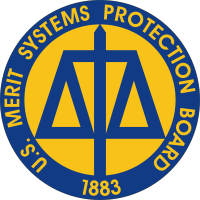Merit Systems Protection Board
 |
|
| Agency overview | |
|---|---|
| Formed | January 1, 1979 |
| Preceding agency |
|
| Jurisdiction | Federal government of the United States |
| Headquarters | Washington, D.C. |
| Agency executive |
|
| Website | mspb.gov |
The Merit Systems Protection Board (MSPB) is an independent quasi-judicial agency established in 1979 to protect federal merit systems against partisan political and other prohibited personnel practices and to ensure adequate protection for federal employees against abuses by agency management.
When an employee of most Executive Branch agencies is separated from his or her position, or suspended for more than 14 work days, the employee can request that an employee of MSPB conduct a hearing into the matter by submitting an appeal, generally within 30 days. In that hearing, the agency will have to prove that the action was warranted and the employee will have the opportunity to present evidence that it was not. A decision of MSPB is binding unless set aside on appeal to federal court. Along with the Office of Personnel Management and the Federal Labor Relations Authority, the MSPB is a successor agency of the United States Civil Service Commission.
Generally, appeals are heard by the United States Court of Appeals for the Federal Circuit. However, appeals involving claims of discrimination are heard in federal district court.
The Board carries out its statutory mission by:
The largest settlement since the inception of MSPB in 1979 was for $820,000 in Robert W. Whitmore v. Department of Labor. The Board approved the settlement on June 5, 2013. Whitmore was fired after giving Congressional testimony that Occupational Safety and Health Administration's workplace injury and illness program was deliberately ineffective. Whitmore, who had worked for the Bureau of Labor Statistics for 37 years, was represented by noted DC plaintiff's employment lawyer Bob Seldon.
...
Wikipedia
